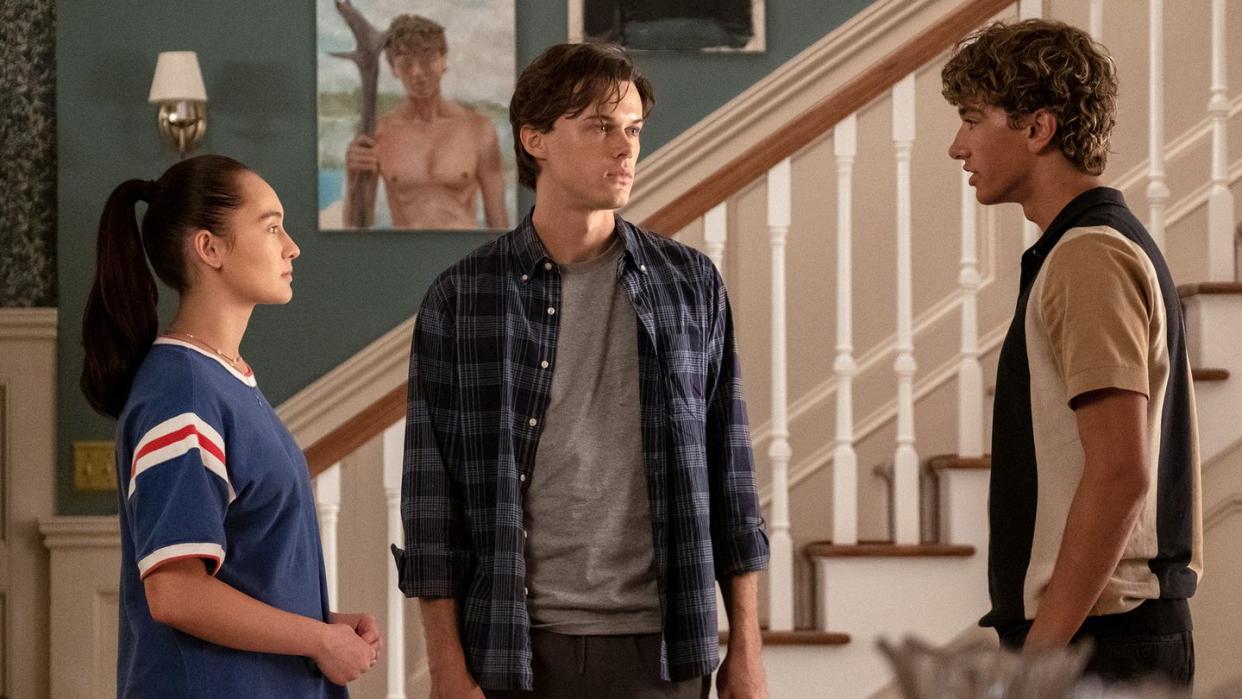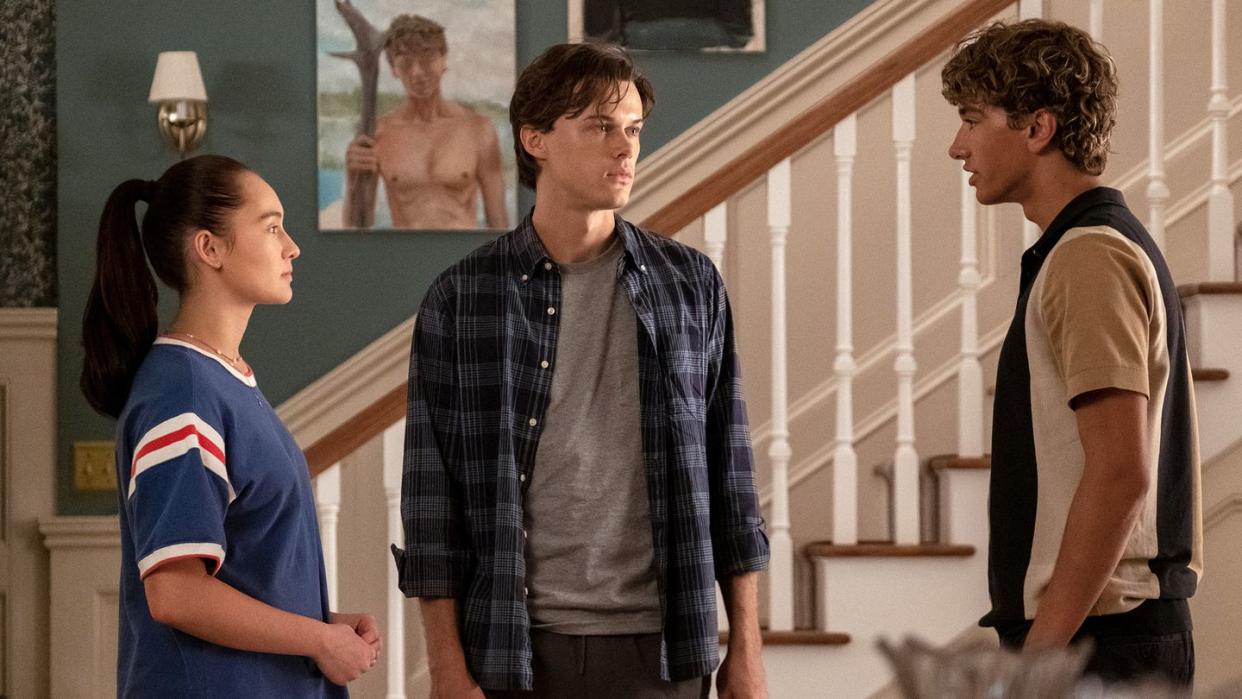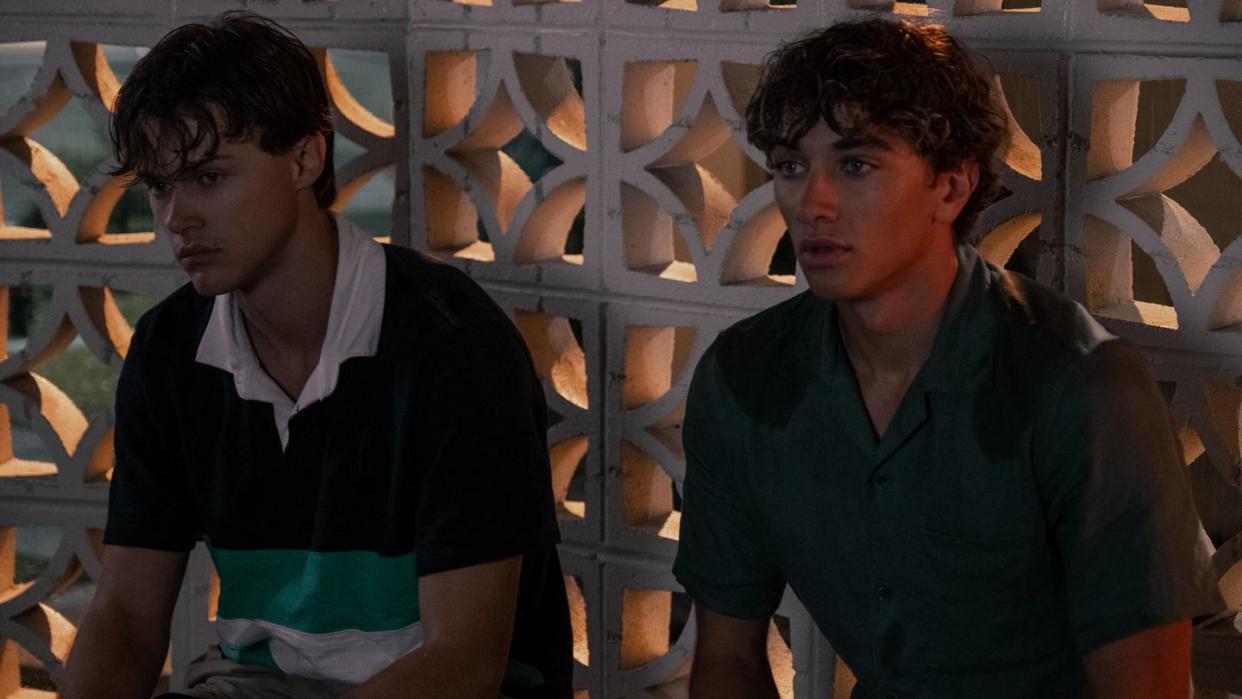I Love You. Wait, No, I Love Your Brother.

The general public is partial to a good love triangle. There’s a reason pop culture tropes like Team Edward vs. Team Jacob still resonate as a conversation starter in the year 2023, after all. And as Prime Video’s buzzy adaption of Jenny Han’s The Summer I Turned Pretty proves, more convoluted love triangles often result in better TV. In the sleepy seaside town of Cousins Beach, teenage Belly (Lola Tung) is caught between two brothers, Conrad (Christopher Briney) and Jeremiah (Gavin Casalegno) Fisher—and nothing makes a love story messier than when family is involved. Throughout a fairly quiet summer for television, TSITP and its quasi-controversial romantic storyline have led the cultural conversation on social media. A brotherly love triangle isn’t a scenario restricted to the TV screen, however. For some, it’s a very real, life-altering experience.
When Sophia* was a teenager, she had a crush on twin brothers she met at summer camp. She claims most people couldn’t tell them apart, but says she always thought Noah was just a tad bit cuter than Ethan. When she and Ethan ended up assigned to the same small group, though, things escalated. “I ended up hooking up with Ethan, but it was weird, because I always thought the other brother was cooler and cuter,” she says. “It definitely had something to do with their twin-ness and settling for Ethan because I wanted Noah more. It was sort of like, This is good enough.”
A few years later, Sophia would end up also kissing Noah: “I still had this thing in the back of my head for Noah, and we were in Israel for something and I thought, Why don’t I try and get with him?”
A story like this might elicit a visceral feeling of unease in some people, because it lies close to a big cultural taboo: incest. The idea of being with two siblings is just something they may never be okay with. For others, the scandalous nature is what draws them in even further—and nothing foments drama like a romance that pits family members against each other. Love triangles—even involving siblings—are not a new trope; they appear in classic novels like Little Women and Persuasion, and show up on our screens in series like The Vampire Diaries, Bridgerton, and The Originals.
TSITP’s main story centers on Isabel “Belly” Conklin and the Fisher brothers, whom she’s spent summers with since she was a young girl. In season one, when she turns 16 and experiences a bit of a glow-up, her lifelong crush Conrad finally seems attainable, but not before she’s kissed first by Jeremiah. As Jeremiah starts to have feelings for Belly, the three teens’ lives are all complicated further, making for some extremely binge-worthy entertainment.

“the summer i turned pretty” more like the summer i ruined a family 💀
— reen (@taysabode) August 14, 2023
Fans of the show have taken to social media to express their uneasiness with the whole situation, especially as season two of the series aired and Belly’s involvement with the brothers only intensified. Viewers felt that having feelings for both boys was okay, but that kissing one after having kissed the other might be a step too far—let alone kissing one after having just ended a relationship with the other. When we end the second season, Belly has started a new relationship with Jeremiah, after Conrad broke things off with her at prom, leaving viewers conflicted over how to feel about this attempt at moving on.
Dr. Orna Guralnik, psychoanalyst and host of Showtime documentary series Couples Therapy, has a Freudian explanation for all of this. “Triangles generally hearken back to the original triangle in childhood—which is the triangle in which desire and rivalry get worked out by way of internalizing social norms—and that’s the Oedipal triangle,” she says. “In heteronormative families, the Oedipal triangle is mother, father, and children. It’s the original scene in which the struggle between desire and competition first happens and first gets established. To me, these novels and TV series are all embellishments or ways to interrogate that kind of unconscious fantasy, which is always there.”
As for the brotherly competition? Nothing to be shocked over, Guralnik says. “Siblings first compete over parental love at the beginning of life. In the end, they compete over the inheritance, which is another version of that,” she says. So, sure, during the middle there might be a little competition over a girl.
In her early 20s, Emily was stuck in a love triangle with brothers Kevin and James. She eventually decided to pursue a relationship with James, only to realize her underlying feelings were really for Kevin the entire time. “It was like a saga of an on-and-off thing with him because I just didn't like him as much as Kevin. James was everything I should have liked: the total package,” she explains. While Kevin and James didn’t necessarily fight over Emily, she noticed the ways James would act when around his brother to assert his dominance. “For a long time, Kevin just wouldn’t talk to me, and I feel like when someone kind of shuts you out, you want them more,” she says.
The novel Every Summer After, by Carley Fortune, revolves around the relationship between 30-year-old Percy and her former best friend and boyfriend Sam. Later in the story, it’s revealed that the major hurdle keeping them apart is that when they were teenagers, Percy slept with Sam’s brother, Charlie. For Fortune, this specific incident was necessary for the story because “it felt like the ultimate betrayal.”
“I was trying to answer the question of What on earth could happen that they would lose each other for a long time? And as soon as I asked myself that question, the answer was very obvious to me,” says Fortune. “It’s very much foreshadowed in the book, but I think it can catch readers by surprise. It felt really real to me. Percy is really insecure in her relationships with her friends and with her boyfriend; and with Sam, they have this history of him pulling away and coming closer and pulling back again, and she wants to feel seen when he abruptly starts cutting her out of his life.”

The question still remains: Why the brother? Even if proximity had nothing to do with it, the way attraction works would be a sufficient explanation. And of course, the fantasy implied by the love triangle is often what draws viewers—and even real people—into it to begin with. For Sophia, it was Noah and Ethan’s bond as twins that made them desirable in different ways. “I don’t know that they would have been so special on their own,” she says. “But there’s something about having the twins who did all this stuff together and were very funny and doing fun things. And I think a lot of people were attracted to that.”
Sex and relationship therapist and researcher Laura Vowels makes another important point. “If we think about the research into attraction, we’re generally attracted to people that are good-looking, have a high status, have good humor, are nice and respectful,” she says. “Imagine two siblings from the same family—they probably have very similar upbringings, they’re going to look somewhat similar, they might have similar ways of talking, and similar humor because they grew up together. It’s basically getting the same person, but twice. If you’re really attracted to one, there’s no reason why you wouldn’t be attracted to the other. Though it’s probably more that one of them is your type, and you just happen to have two of them.”
In many circumstances, there is a “stand-out” brother—like how Sophia always thought Noah was cuter, and how Emily was into Kevin a little more. (Fans of TSITP would argue that it’s Conrad for Belly.) And while their particular flings didn’t develop into true romance, there are cases where something casual with one brother leads to a serious relationship with the other.
When Belly is stuck between two attractive, charming brothers, we also get to be. It’s a way to imagine what it would be like to end up at the center of some pretty improbable—but exciting—drama. Or, if you’re Emily, a way to relive it.
“When I talk about it with my friends, it doesn’t feel real. It almost feels like I’m making it up, even though I’m very much not,” she says. And then, with a dry laugh: “The most recent friend I told responded with ‘Why is your life The Summer I Turned Pretty?’”
*Some names have been changed.
You Might Also Like
